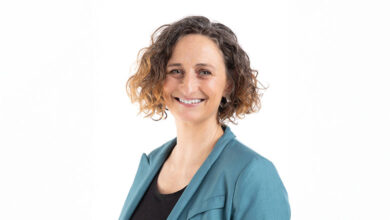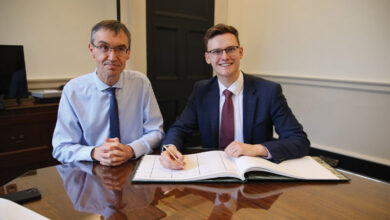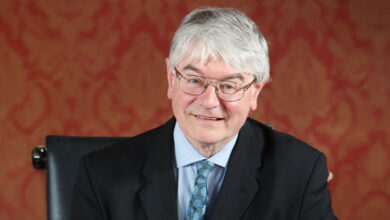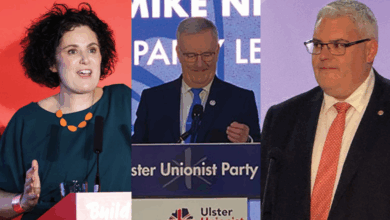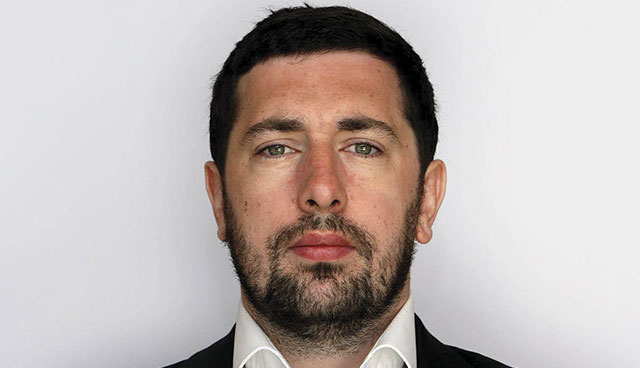
Daniel McConnell is an award-winning broadcast journalist and Political Editor of the Irish Examiner. A graduate of UCD and DCU, he regularly contributes to broadcast outlets, including RTÉ, Virgin Media, Newstalk, TodayFM and the BBC.
How did you get into journalism?
I got involved with the two college papers in UCD which was a fantastic entry into the world of print journalism. The thrill of seeing your name on the front page for the first time is one I remember still to this day.
I went on to become Editor of the University Observer where I worked with some of the very best journalists like Alan Torney (RTÉ), Richard Oakley (Business Post), Enda Curran (Dow Jones, Hong Kong), Steve Cummins (Sunday Times), Samantha Libreri (RTÉ), Niamh Lyons (RTÉ) and many, many more.
From there I went on to do the DCU journalism master’s where I won a placement with the Sunday Times. I have since worked with the Irish Times, Sunday Independent and am five years in my post as Political Editor of the Irish Examiner.
How do you think the profession is evolving?
It is certainly becoming a more challenging industry and the internet has upped the ante in terms of copy expectations and never-ending deadlines. Every day, my team and I mark ourselves against the best of the best in the other outlets so competition is fierce.
The use of social media platforms too has changed the game fundamentally. We use Twitter as a means of marking your opponents and watching politicians, but we use WhatsApp for internal communications within the team.
But, the highly restrictive libel laws continue to make our job of holding the powerful to account very challenging, more so when social media platforms are rarely held to the same standard.
What are the challenges of working in print media?
Obviously, with declining circulations, the pressure on resources is immense.
We in the Irish Examiner have also gone behind a paywall in the past few months and while that has been successful, the transition from print to solely online will take a long time. Balancing those two strands of the business is challenging and encouraging people to pay for content online, which they have gotten for free for so long, is also not easy.
On the plus side, the print media still very much sets the agenda in this country and that is unlikely to change anytime soon.
There are plenty of people who are more than happy to be lickspittles for the powerful in our industry and take joy in having their bellies tickled by government ministers.
Who do you admire most within the industry and why?
There are plenty of people who are more than happy to be lickspittles for the powerful in our industry and take joy in having their bellies tickled by government ministers.
I have always admired those who have been prepared to stand out from the crowd and be the pesky stone in the shoe of those on high.
In an international context, Christopher Hitchens has been a significant influence on me.
Vincent Browne has, in my view, led the way on this during his career and I am a big admirer of him.
Eamon Dunphy is another who has been like a rottweiler to the powerful at times, even if I vehemently disagree with him on many issues.
The late Alan Ruddock was another who I greatly admired from my days with the Sunday Independent.
I have worked under a number of fantastic editors, and I would highlight three who have been fantastic to me. Aengus Fanning my former editor in the Sunday Independent who hired me and launched me as a young buck in the largest and most powerful paper in the country.
Tim Vaughan who hired me as his political editor in the Irish Examiner and my current editor Tom Fitzpatrick who has had my back from day one.
I also admire brilliant journalists like Jerome Reilly, Liam Collins, Ciaran Byrne, Maeve Sheehan, John Burns, and Miriam Donohoe with whom I have been lucky enough to soldier with at various stages.
It is a joy to work alongside my Irish Examiner colleagues Elaine Loughlin, Paul Hosford, and Aoife Moore every day as well as the great Mick Clifford who is simply one of Ireland’s greatest.
Closer to Leinster House, I have always admired John Lee’s courage and tenacity, Senan Molony’s wit and skill while Fiach Kelly, who sadly left our profession to work for government, was a superb hack and story getter.
What has been your most significant story or project to date?
I have been lucky to have worked on some very big and important stories in my career from revealing U2’s plan to leave Ireland for tax reasons in 2006 to my work with whistle-blowers in UCC, the Red Cross and the charity Goal.
But without question the story I am proudest of is the work I have done on the case of ‘Grace’ and ‘Sarah’ – two of 47 intellectually disabled young people who went through a foster home in Waterford where savage abuse took place.
How do you spend your time outside of work?
With three small kids, there is little to do outside of a busy work life that doesn’t involve them. While it is very busy, it is fantastic as they are at a great age, so it is a lot of football training, swimming lessons and the like.
When they are asleep, I enjoy sitting down with she who must be obeyed and relaxing over a glass of wine and some food.
I am an avid reader and music fan so I would love nothing more than to be going back to gigs again.
Also, nothing beats meeting up with friends when possible.

